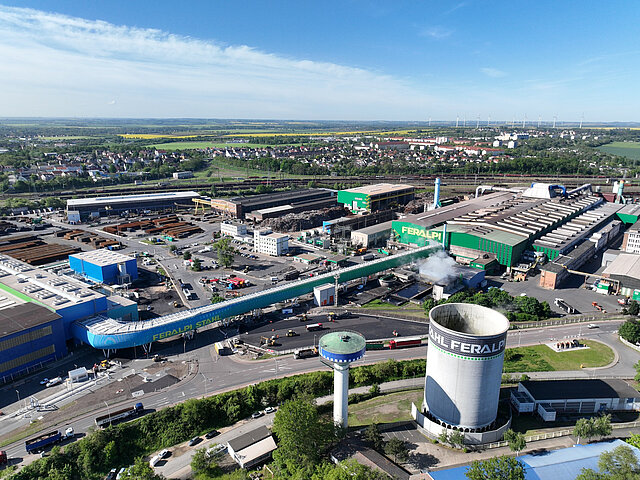
Renewable Energy for Green Steel from Saxony – FERALPI STAHL and JUWI explore joint projects
FERALPI STAHL, part of the Italian Feralpi Group, and JUWI have signed a memorandum of understanding to explore the possibility of cooperating on a regional wind energy project. The project may supply renewable electricity to FERALPI’s steel plant and rolling mills in Riesa in the future. If realized, such a project could make a significant contribution towards achieving the goal of emission-free steel production. At the same time, the two companies aim to strengthen regional value creation and increase local acceptance of renewables.
JUWI has been active in Brandis since 2011 with its own branch to develop and implement projects in the fields of wind and solar energy in Saxony. FERALPI STAHL has been operating the tenth largest steel mill in Germany in Riesa since 1994, employing around 850 people there.
The two companies are jointly exploring how the use of renewable energy can reduce CO2 emissions from steel production. The Feralpi group has ambitious goals: reaching net-zero by 2050.
Initial projects in the neighboring district of Mittelsachsen are scheduled to go into operation by 2029. For FERALPI STAHL, a participation in the form of an investment is an option – provided the project proves economically viable. The two wind farms are planned to consist of five and six wind turbines respectively, and each turbine is expected to generate approximately 20,000,000 kWh of electricity annually.
The planned projects are also intended to increase regional value creation. Instead of importing energy from abroad, the energy will be produced regionally, and both the construction and operation of the wind and solar energy plants will create orders for regional companies. "At the same time, the cooperation to supply an energy-intensive company can serve as a model for further projects in Germany and show that the transformation towards a climate-neutral heavy industry at the German location is possible," explains JUWI Managing Director Christian Arnold.
Together, FERALPI STAHL and JUWI emphasize the benefits of renewables in Saxony for securing local companies and increasing regional value creation.
“We are consistently decarbonizing our production processes. The cooperation with Juwi represents another possible step on our path towards the main goal: to produce green steel in Riesa. Investing more than 220 million euros into our plant in Germany proves that we believe in the future of German steel production”, says Uwe Reinecke, General Manager of FERALPI STAHL.
The agreement between FERALPI STAHL and JUWI is seen as a step within the initiative of several large industrial companies in the region: In 2022, Wacker Chemie AG Nünchritz, FERALPI STAHL, Mannesmann Röhrenwerke, Schmiedewerke Gröditz, Großenhainer Gesenk- und Freiformschmiede GmbH, and the ERVIN steel plant in the Riesa region formed the EWI – Energy and Hydrogen Alliance in the Meißen Industrial Arc to jointly address the challenges in the areas of energy prices and climate protection. The companies represent an annual energy demand of approximately 2.1 billion kWh of electricity and approximately 1.4 billion kWh of natural gas per year.
About the Feralpi Group
The Feralpi Group is one of Europe's leading steel manufacturers (1.7 billion euros in sales in 2024, around 2,000 direct employees in 2024 in seven countries) and specializes in the production of steels for both the construction sector and special applications. The development of Feralpi Siderurgica, founded in 1968 in Lonato del Garda (Brescia) and the leading company in the group, enabled the formation of an international group with a diversified and verticalized production and marketing chain. Feralpi aims not only to be one of the international market leaders in the steel industry, anticipating top standards through technological innovation, sustainability, and talent development. The company also aims to produce the best steels for the construction and machinery industries in the most sustainable way possible, contributing to the economic and social progress of communities, promoting the region, and the well-being of employees, and committing to the transition to development models that aim for greater inclusion and efficiency with lower environmental impacts.



